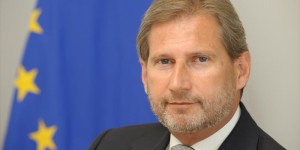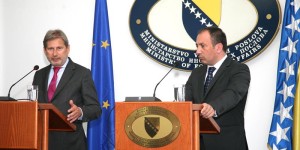6 June 2013
Mr President, Governor, Excellences, Experts, Ladies and Gentlemen, Friends.
Let me begin by thanking the organisers for inviting me to speak at the 7th Annual Meeting of the European Fund for South East Europe.
Bosnia and Herzegovina has over the past years persistently scored low results on many international economic indicators. It lags behind its neighbours in the annual World Bank Report in “Doing Business” and not surprisingly this translates into the relatively low amount of new business established in a year, where Bosnia and Herzegovina also has a regional low score with less than one new company registered per 1,000 people.
Naturally the business environment in Bosnia and Herzegovina – as is the case anywhere else – is not only defined by the local administrative side of establishing a new business, business environment in Bosnia and Herzegovina is also a function of a few other factors:
Firstly, a general political and economic situation that is marred by the perceived absence of a common vision for the country, a factor which in itself may deter foreign investments. I have to say, speaking from where I am, I cannot subscribe to the perception of a lack of a common vision. The vision is there and that is the eventual membership in the European Union. The trouble is, of course, that the perception is sealed by the fact that here we have over the past couple of years seen more talk about the EU than action, hence, the perception of the absence of the common vision.
Secondly, a transport infrastructure in Bosnia and Herzegovina that is in much need of improvement and modernisation makes it more difficult for businesses to reap the benefits of their relatively close proximity to EU markets. It simply takes too long to get the product from here to the EU with the road and rail infrastructure that we have.
Thirdly, a high level of complexity and a lack of transparency in governance practices. The perception of the Bosnia and Herzegovina business community is that administrative burdens, corruption and an over-sized public sector are the major constraints on development of entrepreneurship.
And finally, an issue of direct relevance to this forum today: the limited access of entrepreneurs to financial support and credits, credits that will allow them to get their business prospects “off the ground”. Some 45 per cent of firms in Bosnia and Herzegovina, see access to financing as a major obstacle to the development of their business.
Clearly, there is a close relationship between economic development and political stability and vice-versa of course. Therefore practically all of the priorities and efforts of the European Union regarding Bosnia and Herzegovina have an economic angle.
The EU is the single largest source of financial assistance to Bosnia and Herzegovina. Through our various programmes, the EU has contributed more than EUR 3 billion of grant money to BiH in the past twenty years -second to none.
The foremost vehicle for the assistance of the European Union provides is the multi-annual Instrument for Pre-Accession for “Enlargement Countries”, abbreviated as “IPA”. For 2013 alone we have allocated some 108 million EUR.
These funds cover the Rule of law and Public administration reforms. Both are absolutely critical for a corruption-free and business friendly environment.
The European Union is also planning to provide considerable funds for infrastructure development, mainly transport and energy networks and projects that provide direct benefits to small businesses. Our support to SMEs will focus on transfer of knowledge and new technologies, quality standards, infrastructure and much more.
But, external partners – like us and you in the Fund – can only assist and facilitate a reform process if it is driven by our local counterparts. Through clear conditionality attached to our assistance, we are working closely with our partners in Bosnia and Herzegovina on the reform path that will facilitate, I believe, an improvement of Bosnia and Herzegovina’s competitiveness.
The EU focuses on enabling the structural, the governance aspects, of the economy in close support of the governments of BiH. The economy can only thrive if these efforts go hand in hand with those of courageous, innovative entrepreneurs to open and run new businesses. They can only do so if they have access to proper financing.
This is why the European Union attaches great importance in supporting organisations like this Fund which through facilitation of financing possibilities provide much needed possibilities for small and medium-sized firms.
Bosnia and Herzegovina has a real prospect of becoming an equal member of the European Union. But in order to get there, a sincere and persistent commitment by the political leaders of this country is of paramount importance. Political leaders need to start focusing on – and find common stances on – policies that will help the country as a whole, to finally begin catching up with its neighbours. It is not enough that they just say they want to do it – they actually need to start doing it. This is what the people of Bosnia and Herzegovina want and this is indeed what they deserve.
Thank you.



